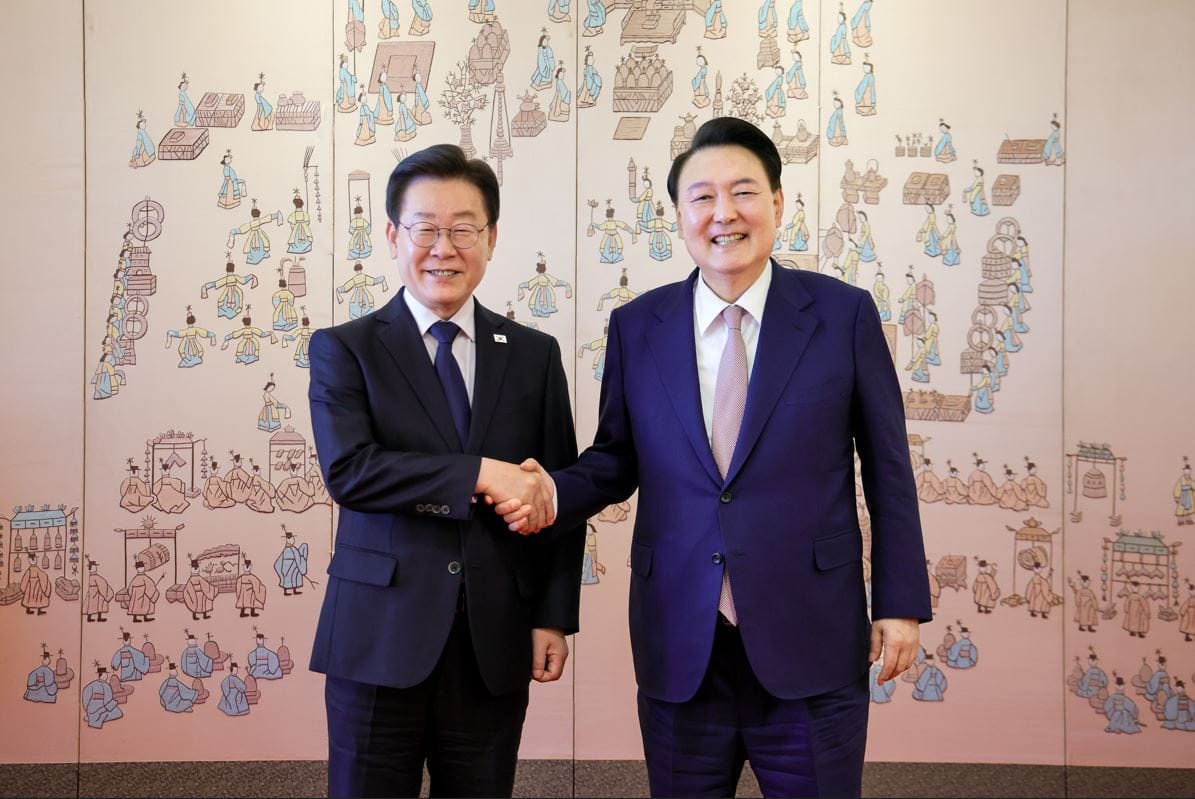Yoon-Lee Summit, Honors for Korean War Hero Puckett, Diplomatic Complexities
The long-awaited meeting between President Yoon Suk-yeol and Democratic Party leader Lee Jae-myung finally took place on April 29, marking the first summit between the two political rivals since Yoon took office nearly two years ago.

Yoon-Lee Summit Signals Potential Shift in Governance Approach
The long-awaited meeting between President Yoon Suk-yeol and Democratic Party leader Lee Jae-myung finally took place on April 29, marking the first summit between the two political rivals since Yoon took office nearly two years ago. While the meeting itself represented a significant step towards more cooperative governance, the substantive results were limited, exposing the deep policy differences and political constraints that still divide the two leaders.
Yoon's recognition of Lee as a legitimate partner in governance was long overdue but nevertheless important, as he had previously rebuffed eight requests from the opposition leader to meet. Lee's concession to sit down with Yoon without preconditions on the agenda also enabled the summit to proceed after initial working-level talks had deadlocked.
The two sides discussed a range of pressing domestic and foreign policy issues during the 2 hour and 15 minute meeting, including the appointment of the new prime minister, mounting economic hardships from high inflation and interest rates, reforms in education, labor and pensions, and aligning responses to U.S.-China tensions and the restructuring of the semiconductor industry. Lee pushed for a 250,000 won pandemic relief payment to all citizens, which Yoon is likely to resist as a populist measure. The politically charged case of a Marine Corps sergeant's death also remains a point of contention.
While both leaders expressed some disappointment at the lack of concrete agreements, they affirmed the need for continued dialogue. However, the unequal speaking time, with Lee taking up 85% compared to Yoon's 15%, indicated a continuing imbalance of power in the relationship. Lee sought to assert his authority as leader of the majority party and push an alternate agenda, while Yoon was compelled to engage after a bruising defeat in the recent legislative elections that left him leading a minority government.
Building genuine trust and narrowing policy differences will require a sustained effort and skilful political leadership from both sides. Emotional resentments still run deep and the temptation for political grandstanding remains. But with Yoon's approval rating plummeting to an all-time low of 23% and the public increasingly frustrated with the "politics of confrontation" at a time of mounting economic pain and security threats, the political incentives for cooperation are growing.
Governance paralysis is no longer tenable if South Korea is to effectively tackle the challenges it faces at home and abroad.
The Yoon-Lee summit may have cracked the door open to a more cooperative mode of governing, but partisan hostilities still threaten to slam it shut. Normalizing the meetings and launching working-level consultative bodies on critical policy issues could help build momentum for bipartisan collaboration. With the U.S.-China rivalry intensifying and North Korea's nuclear threats expanding, South Korea can ill afford a house divided.
Korean War Hero Puckett Receives Unprecedented Honors
Col. Ralph Puckett Jr., a legendary U.S. Army Ranger, who led the defense of Hill 205 in North Korea in November 1950 and saved the lives of his outnumbered soldiers, was laid to rest in the U.S. Capitol Rotunda on April 29 after passing away at age 97 on April 8. Puckett is the first and only Korean War veteran to be accorded the rare distinction of "lying in honor," a tribute typically reserved for the nation's most revered military and civic leaders.
The bipartisan outpouring of praise from top U.S. leaders at Puckett's memorial service underscored the enduring significance of the U.S.-South Korea alliance that he helped forge with his valor and sacrifice over 70 years ago. House Republican Leader Kevin McCarthy extolled Puckett as the embodiment of "the American spirit of selfless courage," while Senate Republican Leader Mitch McConnell said his heroism would remain "an eternal example for every warrior who follows in his footsteps."
In 2021, Puckett was awarded the Medal of Honor, the U.S.' highest military decoration, by President Biden in a White House ceremony attended by President Moon Jae-in. Last year, Puckett received the Taegeuk Order of Military Merit, South Korea's top military honor, in another powerful symbol of the deep ties between the allies.
Puckett's passing was also marked by a poignant moment of people-to-people solidarity between the U.S. and South Korea. At the Capitol memorial, a Korean-American soldier, Sgt. Esther Yoo of the U.S. Army Band "Pershing's Own," volunteered to sing the hymn "In the Garden," offering a musical tribute that connected her own immigrant experience to Puckett's sacrifice for her ancestral homeland.